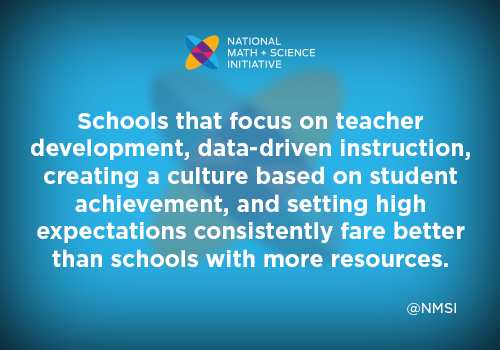Catalysts for Improving our Classrooms
January 15, 2014
In the laboratory, a catalyst is defined as a “substance that enables a chemical reaction to proceed at a usually faster rate or under different conditions than otherwise possible.” And in the realm of education, a catalyst can act as an “agent that provokes or speeds significant change or action.” This is precisely what we need – a catalyst – to help improve our education system, improve student outcomes, and close the achievement gap.
What can we do to solve these problems, and who is in the best position to act as a catalyst in the classroom? The National Assessment Governing Board sought to answer these questions by hosting “The Education Summit for Parent Leaders” this week, which featured several compelling speakers—many of whom placed the emphasis on both the teacher and the parent.

One speaker’s message stood out in particular – Dr. Charles M. Payne, the Frank P. Hixon Distinguished Service Professor in the School of Social Service Administration at the University of Chicago. Dr. Payne asserts that parents are indeed the catalyst to bring about changes in schools. Engaging families and making parents a respected partner at the table is essential to understanding what steps we need to take to improve our education system. To this effect, Dr. Payne suggested a number of ways for parents to become involved in their local school system, from something as simple as attending parent-teacher conference night to observing classrooms with instructional coaches.
Of course, as important as the role of the parent is, we must not forget about our teachers. Dr. Payne also highlighted the importance of teachers when it comes to a student’s classroom experience and the influence they have on a student’s level of engagement and success. To further emphasize his point, Dr. Payne even maintained that students can even be influenced by whether they think a teacher is good or not.
So what makes a good teacher? According to Dr. Payne, the following items are signs of a good teacher, and are absolutely necessary in high quality instruction:
•Their students are engaged in the learning process
•They are relentless in their pursuit of success and excellence
•They cause their students to think critically
•They welcome student questions and help them seek answers
•They use multiple explanations when discussing new ideas
Here at NMSI, we know very well that teachers must be prepared with deep content knowledge if they are to help our students be prepared for the demands of college and the knowledge economy. Our Teacher Training and Comprehensive Advanced Placement programs aim to transform schools all around the country and close the achievement and gender gaps by giving teachers the training and support they need to better engage their students and equip them with the skills they need to be successful.
Click the Button to Tweet! - Parent-teacher engagement is the catalyst we need for improving our classrooms. #edchat #teachchat